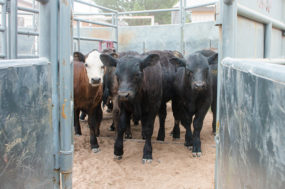I’ve spent a good chunk of this pandemic answering questions I’ve never fielded before. New phrases have come from my lips, such as, “Yes, I will still come out and pull your calf,” “We will do our best to get these calves to grow slower” and “No, I can’t write your 180-pound ‘dog’ a prescription for hydroxychloroquine.” Who knows what else will come up before this is all over?
Of course, though a lot has changed, a lot has stayed the same, especially when you live 20 miles from town. As a friend put it, you sure find out you’re isolated when there’s a worldwide pandemic going on and you can’t notice anything different. And since this was timed perfectly with calving season, the majority of us were in our yearly bovine-induced social distancing program that precluded the possibility of going anywhere anyway. That rolled straight into planting season, so it looks like we’re staying distant until at least the first cutting of hay is baled and stacked.
But let’s be honest, this pandemic has changed a lot of things for all of us. It’s unquestionable that faith in our marketing system has been rattled. Many are asking hard questions about supply chains, not just in our industry, but in others as well. Seeing empty store shelves and Americans arrested for just trying to go to work has shattered our sense of security. As another friend told me, “I’ve stopped laughing at those guys who stocked up on those AK-45s.” I wanted to tell him he was off by two, but I got his point.
I’m hoping that some of these changes end up being for the better and being permanent. A lot of folks rediscovered their families – and that those people really aren’t too bad after all. Maybe they’ll continue to hang out more in the future, like families did in years before. Consumers learned a lot about where their food comes from and about the people, like us, that grow it for them. Maybe in the future we can have good conversations about the use of technology, instead of the adversarial relationship that defined our interactions prior to the pandemic.
I, for one, thought a lot about death. It’s funny how little we think about it, even though we know it’s unavoidable. And considering the dangers of our occupation, it is reasonable to think it can happen at any time. We all know someone who has been killed in a farming accident, even if we are fairly young people. Yet we always think, “It’s not going to be me; it won’t happen to me.”
Watching the death count climb and seeing the news stories about 30-somethings die from COVID reminded me that yes, someday it will be me. Or, worse yet, it will be the people I love, and I’ll still be here. It took a little while to let the panic subside and really think through all this. I realized that yes, it will someday happen, but I can’t let fear of it define my life.
Now I’m not saying that means run around licking New York subway handrails or try to play “pin the tail on the angry Brahman bull” with your shoelaces tied together. What I am saying is that we don’t know when the Lord will call us home, so are we using our time wisely? It sure makes sinning look less attractive. It also makes getting mad over dumb stuff look silly too. What’s the point of missing the last good conversation you would have had with your wife because you were ticked off about the same piece-of-junk mixer wagon breaking again?
Knowing that you’re going to die at some point also makes a person want to mend fences, and I’m not talking about the ones you know won’t hold your neighbor’s bull in. As cattle producers, we are some of the proudest and orneriest people on this planet, and in the process, we can make enemies in our towns and families. Rather than die with spite, just bury the hatchet.
Things can change so fast, be it a pandemic or farming accident. I pray that all of us next year can look back on this when we’re getting our coronavirus vaccine and see how we grew from it. ![]()
Jacob Geis is a veterinarian and blogger in Freeman, South Dakota.






